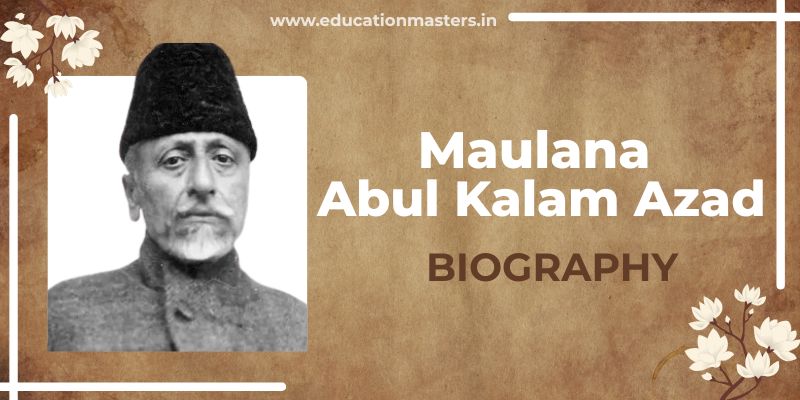KD
I’m Kiran, a content creator at Education Masters. I write and share informative articles on jobs, education updates, and career opportunities to help students and aspirants stay informed and succeed in their goals.

Maulana Abul Kalam Azad was one of India’s most respected freedom fighters, scholars, and educationists. Known for his deep intellect, progressive vision, and commitment to national unity, he played a crucial role in India’s struggle for independence and laid the foundation of the modern Indian education system. His contributions earned him the title of “Architect of Education in Independent India.
|
Field |
Details |
|
Name |
Maulana Abul Kalam Azad |
|
Image |
|
|
Caption |
Maulana Abul Kalam Azad, India’s first Minister of Education, 1947 |
|
Birth Name |
Abul Kalam Ghulam Muhiyuddin Ahmad bin Khairuddin Al-Hussaini Azad |
|
Birth Date |
November 11, 1888 |
|
Birth Place |
Mecca, Hejaz (now in Saudi Arabia) |
|
Death Date |
February 22, 1958 |
|
Death Place |
New Delhi, India |
|
Nationality |
Indian |
|
Citizenship |
Indian |
|
Other Names |
Maulana Azad, Abul Kalam Azad |
|
Education |
Traditional Islamic education; self-taught in philosophy, world history, science, and English literature |
|
Alma Mater |
Studied under private tutors; largely self-educated |
|
Occupation |
Freedom Fighter, Politician, Journalist, Scholar, Educationist |
|
Years Active |
1912–1958 |
|
Known For |
India’s first Minister of Education; key leader in the Indian independence movement |
|
Notable Works |
Establishment of IITs and UGC, promotion of primary and women’s education, Urdu journalism (Al-Hilal), advocacy for Hindu-Muslim unity |
|
Spouse(s) |
Zuleikha Begum |
|
Children |
No surviving children publicly recorded |
|
Parents |
Maulana Khairuddin (father), Alia Bibi (mother) |
|
Relatives |
Descendant of a family of Islamic scholars; part of an Urdu-speaking Indian Muslim family |
|
Awards |
Bharat Ratna (1992, posthumously) |
|
Political Party |
Indian National Congress |
|
Positions Held |
Minister of Education (1947–1958), President of Indian National Congress (1923, 1940–1946) |
|
Publications |
India Wins Freedom, Al-Hilal, Al-Balagh, Tazkirah |
|
Famous Quotes |
“Education imparted by heart can bring revolution in the society.” |
|
Legacy |
National Education Day (November 11) celebrated in his honor |
|
Website |
https://www.education.gov.in (Official Government of India – Ministry of Education) |
Maulana Abul Kalam Azad was born on November 11, 1888, in Mecca, Saudi Arabia, to a family of Islamic scholars. His father, Maulana Khairuddin, was a respected cleric, and his mother came from a noble Arabic family.
When Azad was young, his family moved to Calcutta (now Kolkata), where he received both traditional Islamic and modern education. He was a brilliant student, mastering Arabic, Persian, Urdu, and English at an early age.
Azad was self-taught in many subjects including philosophy, world history, and science. His passion for knowledge and reform was evident from his teenage years, when he began writing articles on education, society, and politics.
Maulana Azad’s life took a major turn when he joined India’s freedom movement against British rule. Deeply influenced by nationalist leaders and revolutionary ideas, he started a Urdu weekly newspaper “Al-Hilal” in 1912, which became a powerful voice against colonial oppression.
The British government later banned the newspaper due to its revolutionary tone, but Azad continued his mission through another publication, “Al-Balagh.”
He became one of the youngest presidents of the Indian National Congress in 1923 and again in 1940, during a critical phase of India’s independence struggle.
Azad worked closely with leaders like Mahatma Gandhi, Jawaharlal Nehru, and Sardar Patel. He firmly believed in Hindu-Muslim unity and opposed the idea of partition. His leadership during the Quit India Movement (1942) further strengthened his role as a national leader committed to India’s unity and freedom.
After India achieved independence in 1947, Maulana Azad became the first Minister of Education in the Government of India, a position he held until his death in 1958.
His vision for education was broad and inclusive. He believed that education should reach every citizen, regardless of class, gender, or religion. Under his leadership, the government introduced several reforms that shaped the future of Indian education.
Foundation of IITs (Indian Institutes of Technology):
Azad played a major role in establishing IITs to promote technical and scientific education in India.
Creation of University Grants Commission (UGC):
He set up the UGC to regulate higher education and ensure quality learning standards.
Promotion of Primary Education:
He emphasized free and compulsory education for children up to the age of 14, recognizing literacy as the key to national progress.
Focus on Women’s Education:
Azad believed that educating women was essential for the advancement of society.
Cultural and Scientific Institutions:
He was instrumental in establishing the Sangeet Natak Akademi, Sahitya Akademi, and Lalit Kala Akademi to promote India’s rich cultural heritage.
Maulana Azad was a firm believer in secularism, education, and national integration. He saw education not merely as a means to acquire knowledge, but as a tool to build character and unity among citizens.
His famous quote reflects his vision:
“Education imparted by heart can bring revolution in the society.”
He always advocated for rational thinking, scientific learning, and equal opportunities in education.
In recognition of his service to the nation, Maulana Abul Kalam Azad was honored with several awards.
In 1992, he was posthumously awarded the Bharat Ratna, India’s highest civilian award.
To commemorate his contributions, the Government of India declared November 11 as National Education Day in 2008.
Maulana Abul Kalam Azad passed away on February 22, 1958, in New Delhi. Though he is no longer with us, his legacy lives on through the institutions he built and the educational reforms he envisioned.
His ideas continue to inspire educators, policymakers, and students to strive for inclusive, quality, and accessible education.
Maulana Abul Kalam Azad’s life was a shining example of intellectual brilliance, patriotism, and dedication to nation-building. From his early writings to his role as India’s first Education Minister, he worked tirelessly to shape an India where knowledge would empower every citizen.
Today, as the nation celebrates National Education Day every year on his birth anniversary, it serves as a tribute to a man who believed that education is the foundation of freedom, progress, and unity.
सरकारी नौकरियों, जीके अपडेट्स और करेंट अफेयर्स की ताज़ा जानकारी सबसे पहले पाने के लिए:
